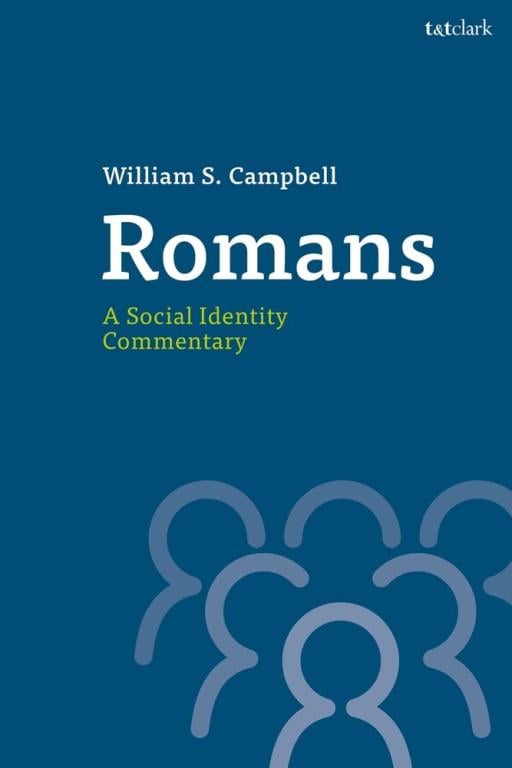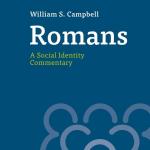The most commented on section of the entire Bible, especially since the Reformation, is Romans 7. I tell my students, don’t even think about doing a thesis on that. You’ll drown in the voluminous publications on it. Let’s talk about Rom. 7.1-6. Here we have an analogy between a married woman whose husband dies, and those who are under some sort of law. The problem with this analogy, as read by Campbell is that the person who has died is not the person in focus. It is the person who was a spouse and lost their husband and thereby is free from the law of husband that is being discussed. Now this analogy applies properly to those who were under the Law, and are so no longer. This surely is a reference to Jews, since the law in question is the Mosaic law. And herein is a major point in the narrative.
Paul has just said all were in Adam, all sinned and all are in need of redemption. This includes Jews like Paul himself. One has to suppose that Paul is solely addressing Gentiles even in Rom. 7 for this to not be the case. If, as Campbell argues, Gentiles were not part of the Mosaic covenant and its law in the first place, then they did not need to be freed from it. Furthermore, Paul describes those that he is talking about as ‘those who know the Law’. This surely fits Jews far better than Gentiles, unless again one imagines Paul is in general (notice the all encompassing term brothers) is addressing God-fearers or proselytes. But unless they have been circumcised Paul says in Galatians, they are not yet under obligation to the Mosaic law in general—they are not yet wearing its yoke. So NO, this argument by Campbell about Rom. 7.1-6 by absolutely does not work. Campbell even notes that Paul calls his fellow Jews brothers in 9.1ff. Right. So here as well. True in Rom. 1.13 it refers to Gentiles, but not so in Rom. 9. So which way is it used here? I would say it refers to Jews in light of the other elements in the passage. Then Paul goes on in vss. 5-6 to contrast what the audience was once, and what they are now, and notice the reference to the Spirit in the latter case, a subject that is entirely absent in Rom. 7.7-25. Notice again the use of ‘we’ in Rom. 7.5-6 which includes Paul and his audience. There is no signs here of a diatribe. He dramatically speaks about those whose passions were ‘aroused by the Law’. If indeed this is the Mosaic Law, who could he be talking about? People like himself would have to be included since his passions and love for that Law led him to persecute Christians and try to do away with them. Who is it that has been released from the old requirements of the written code, and now serves in the new way of the Spirit? This certainly sounds more like Jews such as Paul. But without question, in 7.7, the ‘we’ turns to ‘I’ and we begin to deal with a speech in character, first of Adam, and then in 7.14-25 those who are in Adam and outside of Christ.
Campbell completely ignores the speech in character nature of Rom. 7.7-13 and 7.14-25, wanting to suggest it simply refers in general to Gentile failed attempts to assume the Mosaic law, while still in the bondage to sin. This also doesn’t work. Campbell insists that Jews would not talk about the oldness of the Mosaic covenant? Really? Since it was specifically for them this is precisely how Paul talks about this in 2 Cor.3 contrasting the old and new covenants. Gentiles, who were not under the Mosaic covenant would not likely talk about the oldness of the written code if it wasn’t old for them, much less refer to being slaves under the old written code when they weren’t. And surely the ‘we’ in Rom. 7.5-6 applies to Paul and his audience. Like them he has been set free from obligation to that Law, and indeed set free from the bondage to sin.
Campbell rightly rejects the notion that Paul is speaking autobiographically in Rom. 7, either of his present or his past experience as a Jew. But he does not see that the description in Rom. 7.7-13 does not fit just any non-Jew, but only Adam. Only Adam existed before there was any law, and only Adam received one commandment. And from a rhetorical point of view, the rule was if you are going to do speech in character (not a diatribe by the way) you must assume the mantle of that character and speak as if you were he. The first person singular, according to Quintilian needs to not be of some generic group of a particular historical person who are impersonating, who was recently mentioned in the discourse—- in this case Adam, the one about whom Paul says in him all sinned and all died, because they also sinned.
Then Campbell suggests that the speaker must be a God-fearer or proselyte— no! That would be anachronistic. There were no God-fearers or proselytes before there was a Mosaic covenant. Paul is talking about Adam, and all those who are in Adam in vss. 14-25 from a Christian perspective. This has nothing to do with Gentile proselytes or God-fearers, whom we have no direct knowledge even existed in Paul’s audience. He argues ‘works of the Law’ refers to Gentile God-fearers or proselytes attempting to keep the Mosaic law as a means of right standing with God. The problem with this is shown in detail in early Jewish literature— see Variegated Nomism where the phrase is shown to apply to Jews in relationship to Yahweh.
On p. 215 there is an interesting and helpful quote from L. Keck’s Romans commentary—the Law is neither the problem nor the solution to the human dilemma, human sin. It is not true that intuitive human goodness would flourish if not for the Law with its prohibitions and inhibitions. The other wrong point of view is one that assumes naively that wickedness can be overcome by humans doing the right thing persistently. Both are naïve and wrong.
Another problem with Campbell’s discussion at this point is that Paul uses the term Nomos in more than one way in this passage—- ‘the law of sin and death’ doesn’t refer to the Mosaic law, but rather the ruling principle of sin and death affecting fallen persons. And in Rom. 8 the law of the Spirit of life, refers to the Spirit are the ruling principle in someone’s life which has set them free from the bondage to sin. Furthermore, ‘the law of the mind’ here in RTom. 7 and in Rom. 2 probably refers to the conscience, which approves or disapproves of conduct which a Gentile inherently has, as does everyone, again not a reference to the Mosaic law. Now it may be true that Paul believes that God’s law, epitomized in the Mosaic law, is God’s universal law, which Gentiles have a bit of encoded in their conscience beginning with Adam. To be sure Paul is not here talking specifically about Jews and their struggles to keep the Mosaic Law, he is talking about all those in Adam, particularly Gentiles.













